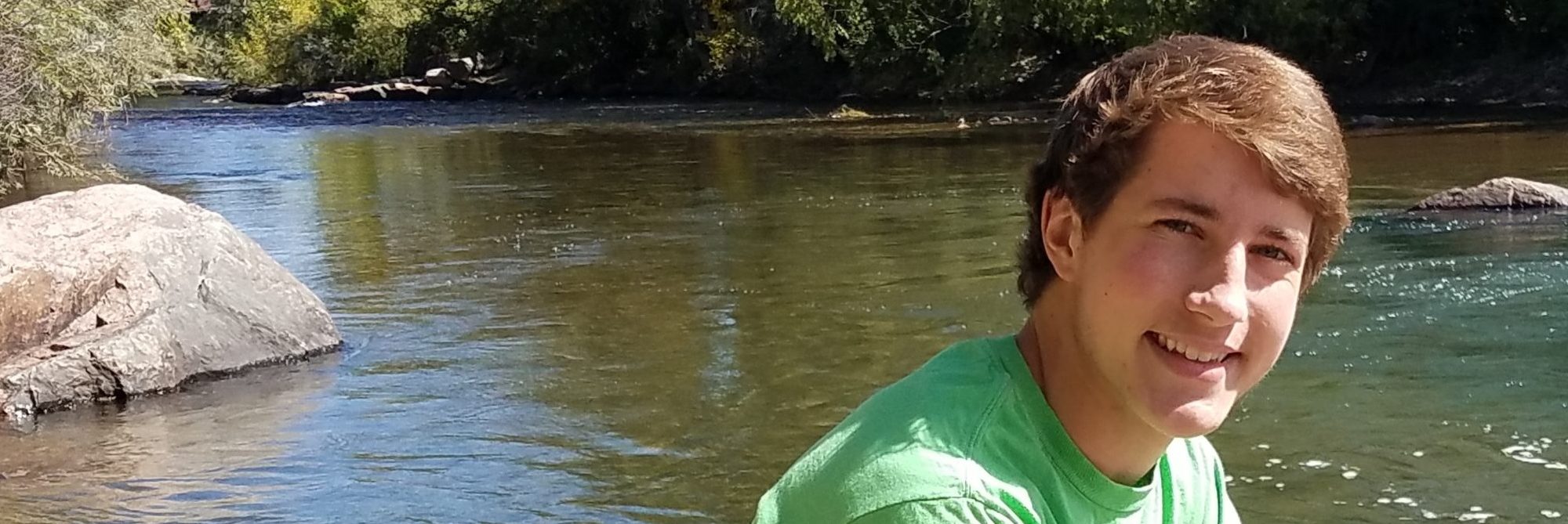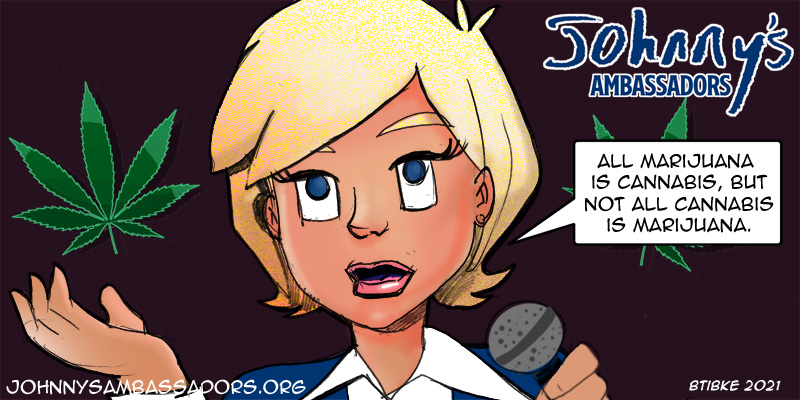By Laura Stack
At Johnny’s Ambassadors, we educate parents and teens about the dangers of today’s high-THC marijuana on adolescent brain development, mental illness, and suicide. Recently, Johnny’s Ambassadors has been asked about our usage of the term “marijuana” versus “cannabis.” Some people have implied the word “marijuana” is racist, while others say it’s not racist. Some argue the word was popularized in the United States to stoke anti-Mexican sentiment. Other people believe the term became popular because of Mexican influence on U.S. culture, not because of a conspiracy to demonize Mexican immigrants.
Marijuana is a product with hundreds of names. The ancient Greeks called it Kannabis, which is where the official botanical nomenclature came from (eg cannabis sativa and cannabis indica). The word marijuana is an Anglicization of the Spanish marihuana, which is itself borrowed from Portuguese and originally borrowed from Arabic, where the psychoactive plant, used for pleasure, is thought to have come from to the New World, carried on Portuguese ships, by Muslim sailors, to Central America. Quite differently than the non-psychoactive plant, American hemp, came to Europe and to America for use in rope. Our laws (and those of other countries, and the UN) happen to call it marihuana. With an H.
Our Scientific Advisory Board has given Johnny’s Ambassadors specific guidance to use the word “marijuana” over “cannabis” in our work. This article explains the four reasons marijuana is the more appropriate term.
- Botanical Classification
Cannabis is the botanical name for a genus of flowering plants. The genus contains three species (sativa, indica, and ruderalis) and hundreds of selectively bred strains. The plants produce about 100 chemicals unique to the genus, and these chemicals are collectively termed “cannabinoids.” The most important cannabinoids are tetrahydrocannabinol (THC), which is intoxicating, and cannabidiol (CBD), which is biologically active but not intoxicating.
Both hemp and marijuana plants are different varieties of the same species, Sativa, which both belong to the cannabis genus. As a species, hemp refers to cannabis strains with negligible THC content. Marijuana refers to cannabis strains, or their dried leaves or flowers, which contain THC. Hemp contains CBD but not THC, and marijuana contains CBD and THC. They are both part of the genus cannabis. In other words, all marijuana is cannabis, but not all cannabis is marijuana. By definition, marijuana plants contain >0.3% (THC), as compared to hemp plants, which contain <0.3% THC.
Classification for Kingdom Plantae Down to Species Cannabis sativa L.
Kingdom: Plantae – Plants
Superorder: Rosanae
Order: Rosales – Rose
Family: Cannabaceae – Hemp
Genus: Cannabis L – Hemp
Species: Cannabis Sativa L. – includes Marijuana and Hemp
“Cannabis” is an umbrella term that refers to both the drug that people use to get stoned, and hemp, which isn’t psychoactive and is used for cloth. So, it isn’t sufficient to define the type of plant. Same plant, different purposes, same word. Therefore, we use the term “marijuana” to describe THC-containing plants, leaves, or flowers from the Cannabis Sativa L species. Cannabis is an umbrella term to describe the entire genus, and marijuana is a specific term to describe the intoxicating species.
2. Government Regulations
These existing governmental organizations use the word ‘marijuana’:
- The National Institutes of Health (NIH) says, “The word ‘marijuana’ refers to parts of or products from the plant Cannabis sativa that contain substantial amounts of tetrahydrocannabinol (THC). THC is the substance that’s primarily responsible for the effects of marijuana on a person’s mental state. Some cannabis plants contain very little THC. Under U.S. law, these plants are considered ‘industrial hemp. rather than marijuana.”
- National Institute on Drug Abuse (NIH/NIDA) – Marijuana Drug Facts
- Centers for Disease Control and Prevention (CDC) – What Are the Health Effects of Marijuana?
- Controlled Substances Act (CASA) – Uses the word “marihuana” to refer to the cannabis plant and its derivatives. This report uses the more widely accepted spelling, “marijuana,” unless quoting other sources.
- Office of the Surgeon General – Marijuana Use and the Developing Brain
- U.S. Drug Enforcement Administration (DEA) – Defines marijuana as a Schedule 1 Substance.
- Substance Abuse and Mental Health Services (SAMHSA) – Learn About Marijuana Risks
- 2018 Farm Bill – removed industrial hemp from the definition of marijuana as a schedule 1 substance.
3. Legal Definitions and State Statute
The majority of state laws that have legalized cannabis have used the term “marijuana.” Johnny’s Ambassadors is based in Colorado, the first state to legalize recreational marijuana. Our Department of Public Health and Environment uses the term ‘marijuana’ to describe the specific variety of the cannabis sativa L species, so we follow this guidance to avoid confusion. For example, the statues refer to a Medical Marijuana Card.
Legal definitions of marijuana in many states are considerably broader and may permit any cannabinoid at any concentration to be called “marijuana.” Highly concentrated products such as vaping oils or solid concentrates (e.g., wax, budder, shatter) are often within the legal definition of marijuana in most states.
4. Language
Google Analytics suggests that more people speak of marijuana than cannabis. Here is Webster’s dictionary definition: marijuana: 1. hemp; 2. its dried leaves and flowers, smoked, esp. in the form of cigarettes, for euphoric effects. Here is Britannica’s definition: Marijuana, also spelled marihuana, crude drug composed of the leaves and flowers of plants in the genus Cannabis. The term marijuana is sometimes used interchangeably with cannabis; however, the latter refers specifically to the plant genus, which comprises C. sativa and, by some classifications, C. indica and C. ruderalis. Marijuana is known by a variety of other names, including pot, tea, grass, and weed. It is usually dried and crushed and put into pipes or formed into cigarettes (joints) for smoking. It can also be added to foods and beverages.
You’re going to want to use the language that corresponds to the way that ordinary people use the drug,” says Geoffrey Nunberg, a linguist who teaches at the UC Berkeley’s School of Information. “I don’t think ‘cannabis’ is ever going to push out ‘marijuana’ in the general lexicon.”
Even Cannabis legalization proponents use the word marijuana in their names. For example, the National Organization for the Reform of Marijuana Laws, the Marijuana Policy Project, Help End Marijuana Prohibition Party of Australia, and the Marijuana Party of Canada all use this term.
Finally, the Associated Press Stylebook provides these guidelines to “Use marijuana on first reference generally; pot and cannabis are also acceptable. Cannabis is the usual term outside North America.”
Conclusion
We hope this article helps clear up the confusion about the difference between cannabis and marijuana. Some components of the marijuana plant, such as the CBD in the prescription drug, Epidiolex, have been used to treat rare seizure disorders. In an attempt to emphasize the marijuana drug’s ‘medicinal’ benefits, the pro-marijuana industry will often incorrectly use the term ‘cannabis’ instead of the scientific term ‘marijuana’ to legitimize itself and attempt to mislead people about the drug’s safety. However, THC has been proven to cause harm to adolescent brain development, so we reject this attempt to demonize the word marijuana.
At Johnny’s Ambassadors, we are less concerned about the terminology we use and more concerned about the harms that occur in youth who use marijuana.



This is excellent, Laura. It is very well documented. See my similar analysis at http://duidvictimvoices.org/cannabis-vs-marijuana/.
But be aware that neither cannabis nor marijuana describes the real problem which is THC. Neither term includes concentrates, edibles, wax, oil, shatter and similar products. Legislators are trying to redefine the words cannabis and marijuana to include these chemical extracts.
In my published work I typically refer initially to impairment by marijuana’s THC, and thereafter I call it THC-impairment.
Thank you, Ed! Agree! We use marijuana, since THC is extracted from this variety, versus hemp, which doesn’t have THC (Delta-9) to speak of but can have Delta-8.